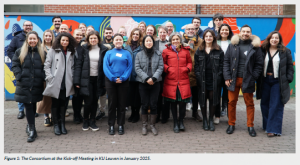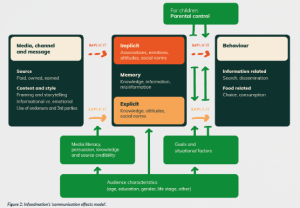Decisions regarding which food to eat are influenced by a variety of factors, including people’s educational level, their economic situation, their health status, where they live, their culture and personal preferences, among others. However, among these factors, one that has not been sufficiently explored yet is the role of food communication practices.
Indeed, in an increasingly connected world, traditional media (TV, radio, newspapers, etc.), social media and marketing play an important role in shaping people’s behaviour—including those related to food. For this reason, the Horizon Europe project Infoodmation examines the effects that these practices have on consumers’ food choices, especially those most vulnerable to them, such as children, adolescents and people of low socioeconomic status.
Over the next three years, the project partners will work to shed light on this topic using a three-step approach. The project will begin by mapping the food communication and marketing approaches, techniques and channels used by different food communication actors. As a second step, the information mapped will be assessed to explore the effects that these practices have on consumers’ food choices. Finally, the insights gathered will be translated into policy recommendations, best practices and responsible business strategies that promote better food communication across Europe.
Mapping the key actors’ communication practices through the Infoodmation Framework
The Infoodmation starting point is the mapping of food media content, defined as any type of media that involves or refers to food. Think of a cooking tutorial on YouTube, a friend’s Instagram post about a new restaurant, a nutrition podcast episode, a typical food advertisement at a train station or on one’s social media, or a news article about food trends. These are all examples of the types of content shared by some of the actors falling into the three categories of key actors defined by Infoodmation: governments, the private sector and civil society. These actors don’t just communicate about food—they directly and indirectly influence what people put on their plates.
Governments and other public institutions, from the EU to the local level, are responsible for setting the rules that shape how food is presented and promoted to consumers. Their decisions define the legal landscape of marketing, labelling and public information campaigns, among others.
The private sector also plays a central role, given that food producers, retailers, media companies, and influencers arguably invest more resources than the other key actors to influence food choices via traditional media, social media and marketing.
At the same time, civil society organisations and NGOs also attempt to influence what and how people eat, for instance, by communicating about and advocating particular patterns of food consumption.
By recognising the key role that the key actors play in food communication practices, Infoodmation places them at the heart of the project. Through participatory methods, such as workshops and focus groups involving stakeholders representing key actors and consumer groups, the project ensures that their perspectives are taken into account at every stage, from validating methods and interpreting results to co-creating meaningful solutions. The project also has a Scientific Advisory Board comprising independent experts to ensure the scientific rigour and transparency of the work performed.
The first activity in which the key actors participated was a workshop (held in May 2025) to fine-tune and validate the Infoodmation Framework for categorising food communication from the key actors. This framework categorises food communication into four main layers (sender, message, medium and audience), which help explain the different aspects of how food-related messages are created, shared and received. The key actors provided feedback on the initial framework and suggested ways to develop it to facilitate its application by
stakeholders.
Assessing the effects of food communication
The project partners are currently collecting exemplary food media content to be categorised by the Infoodmation Framework, which will become the core element for the second phase of the project. The food media content and marketing will be assessed according to a preliminary model of the effects of food communication adapted by Aarhus University, which will be finalised during the second part of 2025. Aarhus University will determine whether the effects of communication practices are based on cognitive and/or emotional responses and establish the mechanisms behind these responses, as well as their impact on consumer knowledge, perceptions and behaviour. At the same time, the fact-checking organisation Maldita will examine the types of food misinformation that have the greatest impact on consumers and how misinformation is spread.
It is worth noting that the model uses a segmentation approach, meaning that the effects will be analysed in consumer groups with different characteristics— such as children, adolescents and people of low socioeconomic status—who may respond differently to the same communication practices. The preliminary work will then be complemented by workshops with stakeholders to gather input and feedback on the results and the effectiveness of parental control in managing the effects of food communication on children.
Translating evidence into action
The goal of Infoodmation is not only to study food communication, but also to propose improvements that consider its impact on people. To this end, the evidence gathered will be used to develop three types of recommendations:
- policy briefs addressing governments at different levels on how to improve policy, regulatory and legal frameworks for food communication
- a handbook of responsible business practices that the private sector could implement for minimising the negative effects that communication and marketing practices can have on consumers
- a collection of best practices on food communication that are already in place and can be easily adopted by the three key actors.
These resources will be made available through the Infoodmation Knowledge Hub, an online platform created to host results and outputs from Infoodmation and other similar research projects, as well as training opportunities and capacity-building programmes on food communication. The platform will also feature initiatives and other EU-funded projects aimed at sharing experiences and tackling misinformation.
Project summary
Infoodmation aims to understand how food communication strategies are used by governments, the private sector and civil society and how they affect consumers’ food choices. By mapping examples of communication practices and assessing their effects on food behaviour, the project will inform best practices, responsible business strategies and policy recommendations to encourage better food communication towards consumers and promote healthy and sustainable diets.
Project partners
Project coordinator European Food Information Council – EUFIC (Belgium)
Aarhus University – AU (Denmark)
BeInfluence (Belgium)
Catholic University Leuven – KU Leuven (Belgium)
Centrum for Social Innovation – ICLEI Europe (Belgium)
Institute of Nutrition – Nutris (Slovenia)
LOBA (Portugal)
Maldita (Spain)
Wageningen University (Netherlands)
ZSI (Austria)
Project lead profile
Betty Chang is the Research Area Lead of the European Food Information Council and the scientific coordinator of Infoodmation. She holds a PhD in cognitive and social psychology and conducts consumer research on all things related to healthy and sustainable eating—including communication and behaviour change—and increasingly takes a food systems approach.
Funding disclaimer
This project has been funded by European Union’s Horizon Europe research and innovation programme – grant agreement number 101182813.
Views and opinions expressed are however those of the author(s) only and do not necessarily reflect those of the European Union. Neither the European Union nor the granting authority can be held responsible for them.
EUFIC food facts for healthy choices
This article is part of the collaboration between EUFIC and the PRj, as members of its editorial board. EUFIC – The European Food Information Council, is a nonprofit organisation, established in 1995. EUFIC’s mission is to provide engaging science-based information to inspire and empower healthier and more sustainable food and lifestyle choices.
Figure legends
Figure 1: The Consortium at the Kick-off Meeting in KU Leuven in January 2025.
Figure 2: Infoodmation’s ‘communication effects model’.



